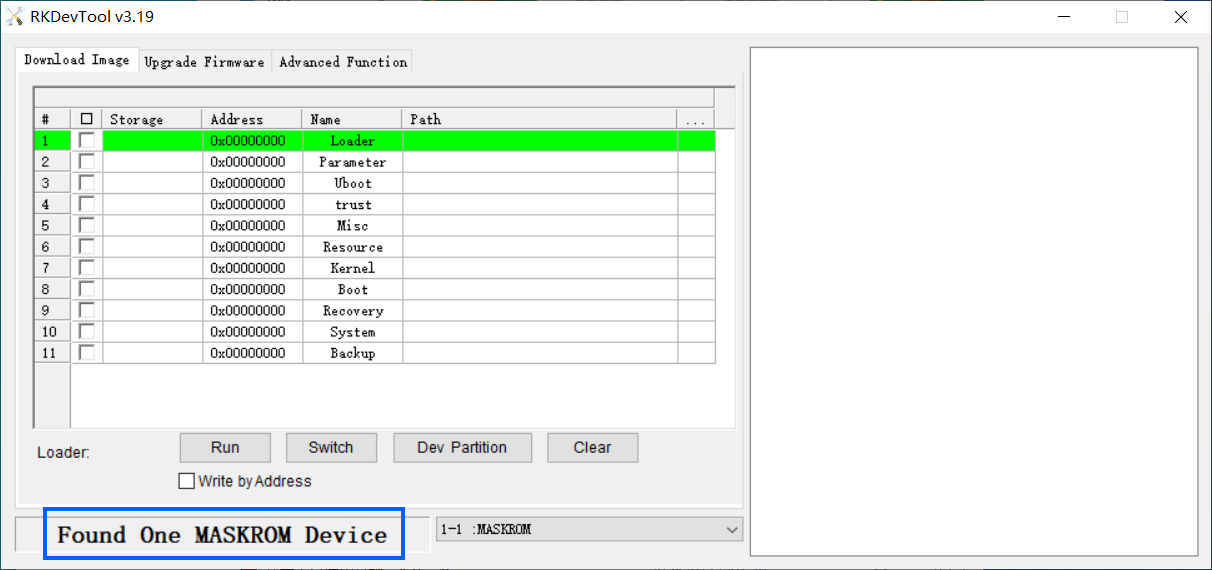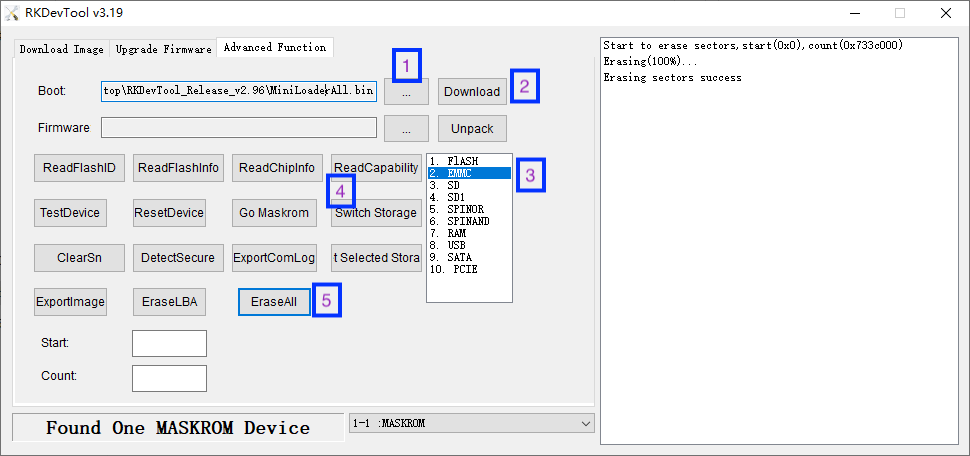|
|
| (167 intermediate revisions by the same user not shown) |
| Line 1: |
Line 1: |
| − | '''(Note: The following content is translated by Google translate)'''
| |
| − | ===2019-05-11===
| |
| − | * '''Android 8.1: '''
| |
| − | 1) Added support for NanoPC-T4 PWM fan, support automatic speed regulation according to CPU temperature<br />
| |
| − | 2) Add SSD support (Note: SSD partition needs to be ext4 format)<br />
| |
| − | * '''FriendlyCore, FriendlyDesktop: '''
| |
| − | 1) Kernel version updated to v4.4.167<br />
| |
| − | 2) the isp driver of the camera is upgraded from cif_isp10 to rk_isp1, supporting dual mipi cameras to work at the same time<br />
| |
| − | 3) OpenCV is upgraded to the latest version 4.1, supporting dual mipi camera and USB camera (logitech C920)<br />
| |
| − | 4) 4G network support is added to the Linux system (module: Quectel EC20)<br />
| |
| − | 5) Add Aanopc-t4 PWM fan support<br />
| |
| − | * '''EFlasher system: '''
| |
| − | 1) Reduced file system size<br />
| |
| − | 2) The network configuration is changed from DHCP to static IP address (192.168.1.231)<br />
| |
| | | | |
| − | ===2019-03-08===
| + | {{RockchipUnbrick|NanoPC-T4}} |
| − | * '''Add Buildroot project:'''
| + | |
| − | Add Buildroot Linux system, based on Rockchip original RK3399 Linux SDK, project open source, please refer to the details:[[Buildroot for RK3399|Buildroot for RK3399]]
| + | |
| − | * '''Android 8.1 update is as follows: '''
| + | |
| − | 1) Optimized LCD and HDMI screen rotation settings, support for command line operations (command: wm rotation 90)<br />
| + | |
| − | 2) Fix the problem that the microphone cannot sound after forcing the audio output to the headphones<br />
| + | |
| − | * '''FriendlyCore, FriendlyDesktop, Lubuntu is updated as follows: '''
| + | |
| − | 1) Kernel version updated to v4.4.154<br />
| + | |
| − | 2) Docker support<br />
| + | |
| − | 3) Kernel configuration items are optimized to enable more features and device drivers<br />
| + | |
| − | 4) Fixed an issue where USB WiFi could not be used<br />
| + | |
| − | 5) Fix the stability problem of ISP camera<br />
| + | |
| − | ===2018-12-19===
| + | |
| − | * '''Android 8.1 update is as follows: '''
| + | |
| − | 1) Update the AOSP source version to Android8.1-SDK v5.00-20181109<br />
| + | |
| − | 2) Add HDMI resolution and HDMI overscan setting UI<br />
| + | |
| − | 3) Add audio output settings, you can set the default output to headphones or HDMI<br />
| + | |
| − | 4) Add OV13850 and wide dynamic OV4689 camera support<br />
| + | |
| − | * '''FriendlyCore is updated as follows: '''
| + | |
| − | 1) Added OV13850 and wide dynamic OV4689 camera support<br />
| + | |
| − | 2) Added ffmpeg support, provides static libraries and header files, supports 4K hardware decoding (does not support hardware encoding)<br />
| + | |
| − | 3) Added mpv player, supports 4K hardware decoding<br />
| + | |
| − | * '''FriendlyDesktop is updated as follows: '''
| + | |
| − | 1) Added OV13850 and wide dynamic OV4689 camera support<br />
| + | |
| − | 2) Add Chrome-browser browser, support web page 1080P hardware decoding, support WebGL<br />
| + | |
| − | 3) Added ffmpeg support, provides static libraries and header files, supports 4K hardware decoding (does not support hardware encoding)<br />
| + | |
| − | 4) Fix the volume adjustment Issue<br />
| + | |
| − | 5) Set the audio output channel to HDMI by default (can be modified by /etc/pulse/default.pa)<br />
| + | |
| − | 6) Optimize the local player, associated with the mp4 file<br />
| + | |
| − | 7) Automatically enable swap partitioning for NEO4<br />
| + | |
| − | 8) Fix the issue of hostapd related issues<br />
| + | |
| − | 9) Adjust DPMS settings, turn off automatic sleep by default<br />
| + | |
| − | * '''Lubuntu updated as follows: '''
| + | |
| − | 1) Added OV13850 and wide dynamic OV4689 camera support<br />
| + | |
| − | 2) Add Chrome-browser browser, support web page 1080P hardware decoding, support WebGL<br />
| + | |
| − | 3) Set the audio output channel to HDMI by default (can be modified by /etc/asound.conf)<br />
| + | |
| − | 4) Optimize the local hard disk player, associated with the local mp4 file, double-click the local video to start the local hard disk player playback (only mp4 files are supported)<br />
| + | |
| − | 5) Fixed some issues regarding the package error reported in the previous version<br />
| + | |
| − | 6) Adjust DPMS settings, turn off automatic sleep by default<br />
| + | |
| − | ===2018-11-12===
| + | |
| − | * Android 8.1 update is as follows:
| + | |
| − | 1) Add support for USB-C display<br />
| + | |
| − | 2) Add support for 4G network, the model number of the support module is: Quectel EC20<br />
| + | |
| − | 3) Add Android hardware access library FriendlyThing for programming various hardware resources under Android, such as Uart, SPI, I2C, GPIO, etc.<br />
| + | |
| − | 4) Optimize kernel configuration to improve PCIe performance, and connect NVME SSD will have a large performance improvement<br />
| + | |
| − | 5) Integrate the Google Play app store<br />
| + | |
| − | 6) Improve the underlying support of the camera so that it can automatically adapt to vertical screen (HD702E) and landscape (HDMI)<br />
| + | |
| − | 7) Fix the problem that the partition table is abnormal when Android8 is connected to NVME SSD and Android8 cannot be started.<br />
| + | |
| − | * Android 7.1 update is as follows:
| + | |
| − | 1) Add support for 4G network, the model number of the support module is: Quectel EC20<br />
| + | |
| − | 2) Add Android hardware access library FriendlyThing for programming various hardware resources under Android, such as Uart, SPI, I2C, GPIO, etc.<br />
| + | |
| − | 3) Optimize kernel configuration to improve PCIe performance, and connect NVME SSD will have a large performance improvement<br />
| + | |
| − | 4) Improve the underlying support of the camera so that it can automatically adapt to vertical screen (HD702E) and landscape (HDMI)<br />
| + | |
| − | 5) Fix the problem that the partition table is abnormal when Android8 is connected to NVME SSD and Android8 cannot be started.<br />
| + | |
| − | * FriendlyCore and FriendlyDesktop are updated as follows:
| + | |
| − | 1) Added support for OV13850 camera, provides gsteamer plugin to support ISP<br />
| + | |
| − | 2) Add WiringPi support for C language programming to access hardware resources such as GPIO<br />
| + | |
| − | 3) Added WiringPi-Python support for Python programming access to hardware resources such as GPIO<br />
| + | |
| − | 4) Optimize kernel configuration to improve PCIe performance, and connect NVME SSD will have a large performance improvement<br />
| + | |
| − | ===2018-09-21===
| + | |
| − | * Added support for an eDP screen
| + | |
| − | * Linux has enabled PCI-E to Sata function (AHCI SATA support)
| + | |
| − | * SquashFS under Linux enables LZO/XZ/ZSTD compression support
| + | |
| − | ===2018-09-05===
| + | |
| − | * Add new OS: Android 8.1, the main features are as follows:
| + | |
| − | 1) Support 2 CAM1320 (OV13850) at the same time, you can choose to switch between before and after camera use<br />
| + | |
| − | 2) Support USB camera (1 way, can not be used simultaneously with CAM1320)<br />
| + | |
| − | 3) Support AndroidNN GPU acceleration solution, which provides general acceleration support for AI related applications developed with AndroidNN API<br />
| + | |
| − | 4) Integrate the Tensorflow Lite item identification demo provided by Rockchip: TfLiteCameraDemo (connect CAM1320 or USB camera before starting)<br />
| + | |
| − | 5) Integrated Lightning is the default browser application (Note: Android official does not provide Browser application by default)<br />
| + | |
| − | 6) Support RC-100 infrared remote control, support pull-down notification bar, screen capture<br />
| + | |
| − | 7) Support Android full disk encryption function, system partition has Verity enabled, when using adb, adb root; adb disable-verity command disable Verity<br />
| + | |
| − | 8) Support MTP function, after connecting Type-C, you can enter Settings -> Connected devices -> USB to select the corresponding function<br />
| + | |
| − | 9) Upgrade the kernel version to 4.4.126<br />
| + | |
| − | 10) Update the AOSP source to the version android-8.1.0_r41 and update the August security patch<br />
| + | |
| − | * FriendlyCore adds Qt dual camera sample program: the example is located in /opt/dual-camera directory, run by run.sh (two USB cameras must be connected before starting, it is recommended to use Logitech C270 or Logitech C922 camera)<br />
| + | |
| − | * FriendlyDesktop defaults to HDMI resolution of 1080P<br />
| + | |
If the ROM is not installed correctly, causing the development board to become bricked, and you might not have the opportunity to reinstall the ROM via an SD card, you need to enter Maskrom mode to unbrick it by erasing the storage device.
The following commands are for Linux, with only slight differences in file and directory names for Mac users:
A result similar to "DevNo=1 Vid=0x2207,Pid=0x350b,LocationID=13 Mode=Maskrom SerialNo=" indicates that the device has been detected.

